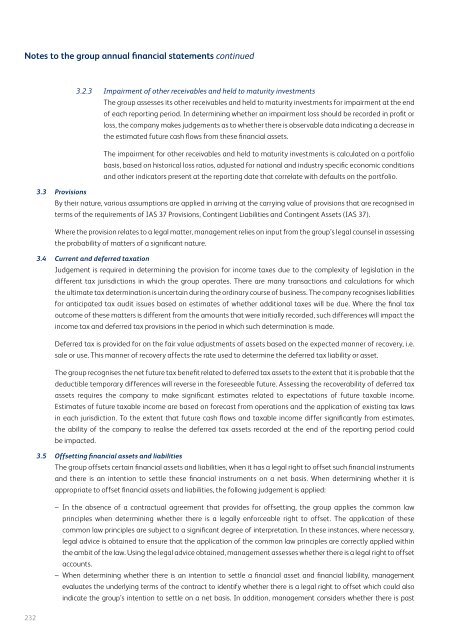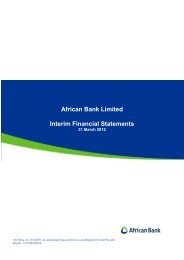Full annual report - African Bank - Investoreports
Full annual report - African Bank - Investoreports
Full annual report - African Bank - Investoreports
You also want an ePaper? Increase the reach of your titles
YUMPU automatically turns print PDFs into web optimized ePapers that Google loves.
Notes to the group <strong>annual</strong> financial statements continued<br />
232<br />
3.2.3 Impairment of other receivables and held to maturity investments<br />
The group assesses its other receivables and held to maturity investments for impairment at the end<br />
of each <strong>report</strong>ing period. In determining whether an impairment loss should be recorded in profit or<br />
loss, the company makes judgements as to whether there is observable data indicating a decrease in<br />
the estimated future cash flows from these financial assets.<br />
The impairment for other receivables and held to maturity investments is calculated on a portfolio<br />
basis, based on historical loss ratios, adjusted for national and industry specific economic conditions<br />
and other indicators present at the <strong>report</strong>ing date that correlate with defaults on the portfolio.<br />
3.3 Provisions<br />
By their nature, various assumptions are applied in arriving at the carrying value of provisions that are recognised in<br />
terms of the requirements of IAS 37 Provisions, Contingent Liabilities and Contingent Assets (IAS 37).<br />
Where the provision relates to a legal matter, management relies on input from the group’s legal counsel in assessing<br />
the probability of matters of a significant nature.<br />
3.4 Current and deferred taxation<br />
Judgement is required in determining the provision for income taxes due to the complexity of legislation in the<br />
different tax jurisdictions in which the group operates. There are many transactions and calculations for which<br />
the ultimate tax determination is uncertain during the ordinary course of business. The company recognises liabilities<br />
for anticipated tax audit issues based on estimates of whether additional taxes will be due. Where the final tax<br />
outcome of these matters is different from the amounts that were initially recorded, such differences will impact the<br />
income tax and deferred tax provisions in the period in which such determination is made.<br />
Deferred tax is provided for on the fair value adjustments of assets based on the expected manner of recovery, i.e.<br />
sale or use. This manner of recovery affects the rate used to determine the deferred tax liability or asset.<br />
The group recognises the net future tax benefit related to deferred tax assets to the extent that it is probable that the<br />
deductible temporary differences will reverse in the foreseeable future. Assessing the recoverability of deferred tax<br />
assets requires the company to make significant estimates related to expectations of future taxable income.<br />
Estimates of future taxable income are based on forecast from operations and the application of existing tax laws<br />
in each jurisdiction. To the extent that future cash flows and taxable income differ significantly from estimates,<br />
the ability of the company to realise the deferred tax assets recorded at the end of the <strong>report</strong>ing period could<br />
be impacted.<br />
3.5 Offsetting financial assets and liabilities<br />
The group offsets certain financial assets and liabilities, when it has a legal right to offset such financial instruments<br />
and there is an intention to settle these financial instruments on a net basis. When determining whether it is<br />
appropriate to offset financial assets and liabilities, the following judgement is applied:<br />
– In the absence of a contractual agreement that provides for offsetting, the group applies the common law<br />
principles when determining whether there is a legally enforceable right to offset. The application of these<br />
common law principles are subject to a significant degree of interpretation. In these instances, where necessary,<br />
legal advice is obtained to ensure that the application of the common law principles are correctly applied within<br />
the ambit of the law. Using the legal advice obtained, management assesses whether there is a legal right to offset<br />
accounts.<br />
– When determining whether there is an intention to settle a financial asset and financial liability, management<br />
evaluates the underlying terms of the contract to identify whether there is a legal right to offset which could also<br />
indicate the group’s intention to settle on a net basis. In addition, management considers whether there is past







